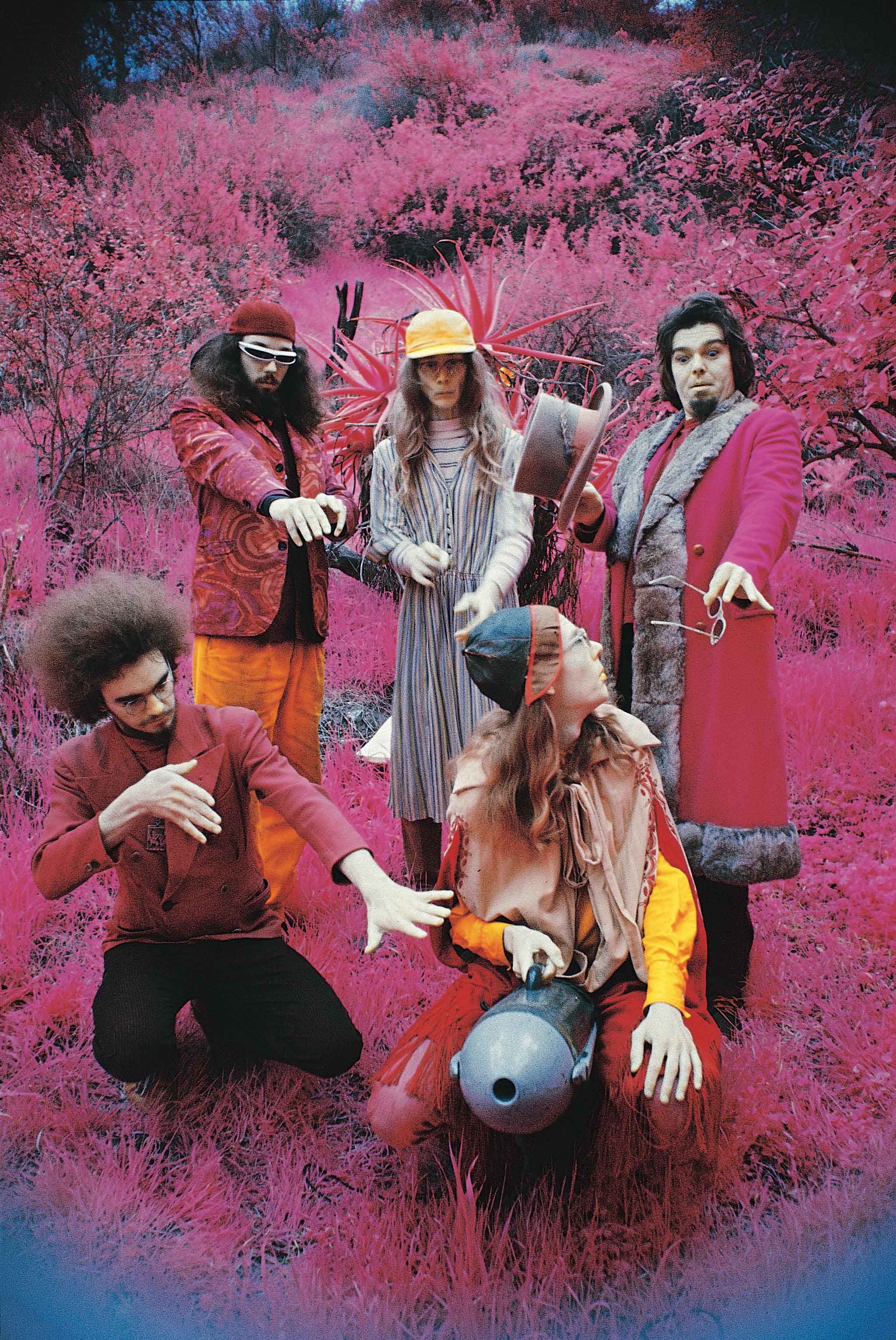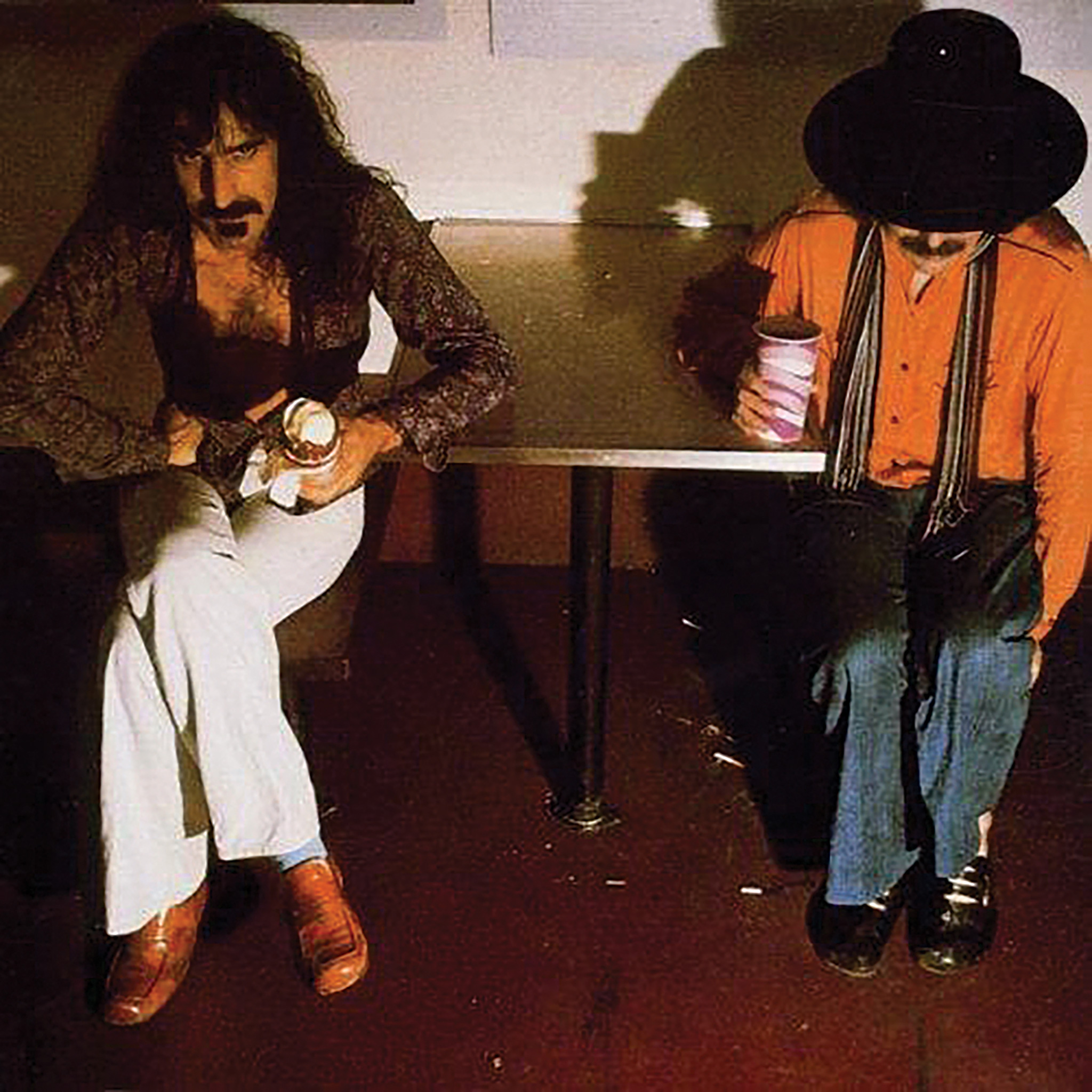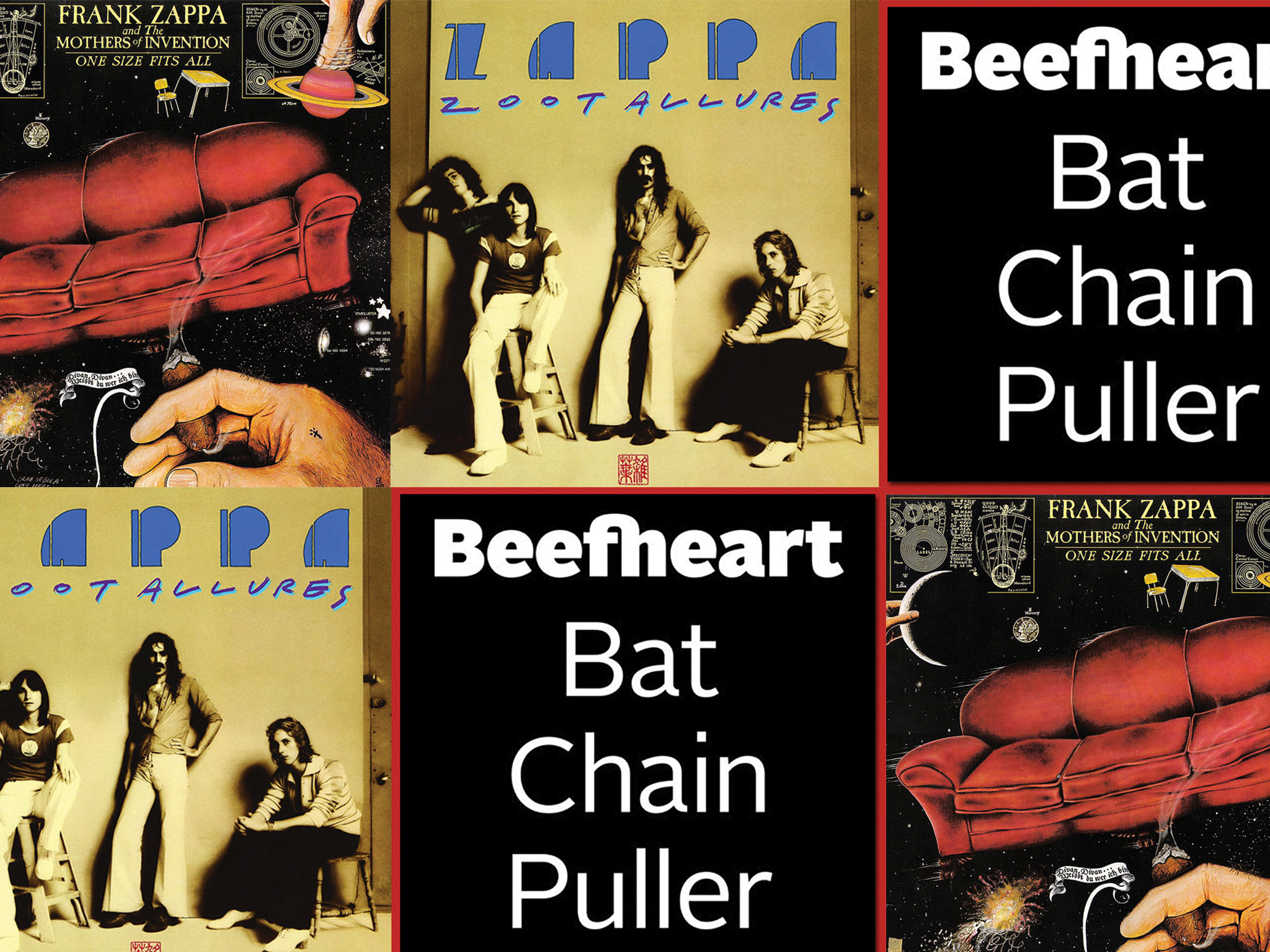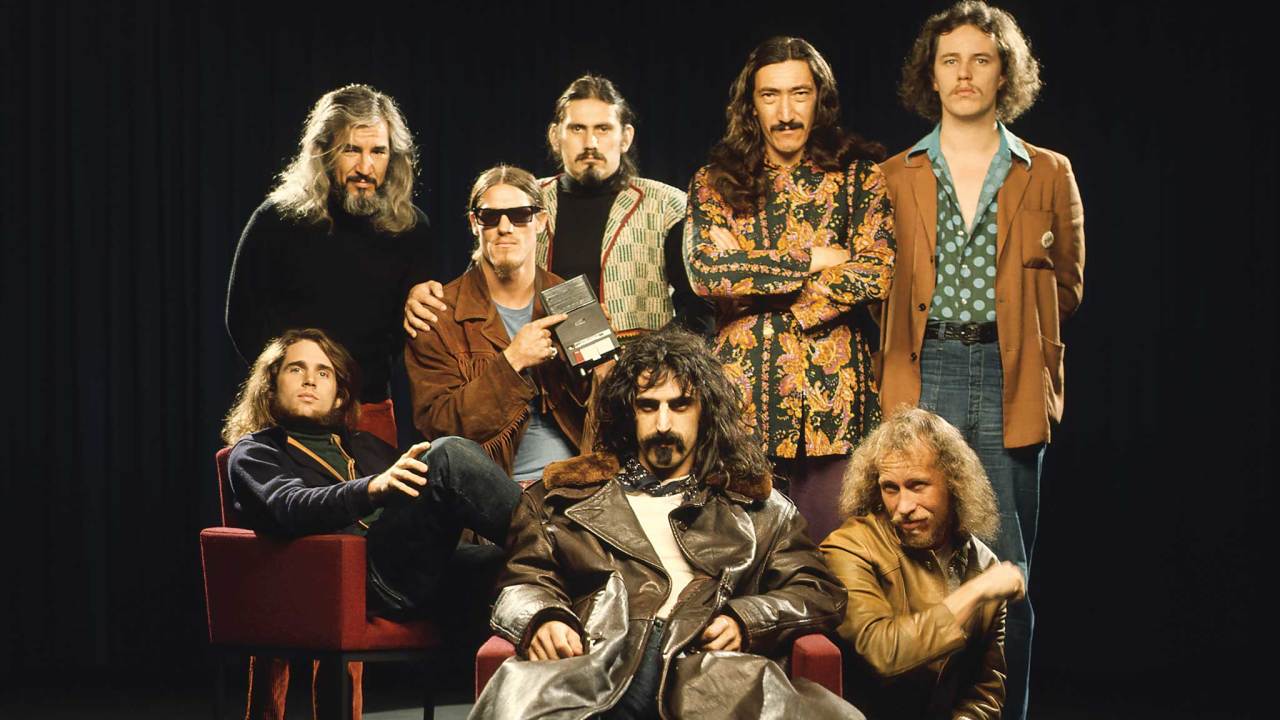The announcement that Frank Zappa And The Mothers Of Invention were going to tour in April and May 1975 – what became known as the Bongo Fury tour – with none other than Captain Beefheart as their guest vocalist, caused something of a stir. To many, to have these two giants of the late-60s LA freak scene together represented a sort of dream team.
Don Van Vliet, aka Captain Beefheart, and Zappa had been friends since school, and Zappa had produced Captain Beefheart & His Magic Band’s Trout Mask Replica in 1969. In the recent past there had been a throughput of ex-Mothers into the Magic Band – including drummer and percussionist Art Tripp, bass guitarist Roy Estrada and lead guitarist Elliot Ingber – so there was another level of connection there. But for all the reasons why it should have worked out on paper, there were at least as many potential pitfalls.
Zappa and Beefheart’s friendship had been hallmarked by a long history of genuine affection and mutual respect, cut with some weapons-grade animosity, mostly coming from Van Vliet. Interviews with him throughout the first part of the decade were regularly spiced up with rants against Zappa to anyone who would listen.
Frank Zappa is the most disgusting character I have ever encountered. He was trying to market me as a goddamned freak – the gall of the man!
The Magic Band’s brand of idiosyncratically structured psychedelic blues rock had been gaining them popularity, particularly in the UK, where they were tirelessly championed by DJ John Peel. In late 1968, Zappa had offered his friend a deal on his Straight label and given him complete artistic freedom, the resulting document being one of the great seismic events in rock music, Trout Mask Replica. It’s difficult to imagine any other label facilitating such an outré double album. But the Straight roster – and that of its sister label Bizarre – also boasted the mentally troubled outsider musician Wild Man Fischer, the nascent shock-rock of Alice Cooper, and the GTO’s, a band of groupies whose limited vocal abilities make Bananarama seem positively operatic by comparison. Zappa seemed to enjoy associations with this kind of musician in a detached, almost Warholesque way. _Trout Mask Replica _was initially released on Bizarre before being moved to Straight and for Van Vliet, that was enough. “Bizarre… what the fuck, man?” he exclaimed to Steve Peacock of Sounds in 1972.
The Mothers Of Invention’s early shows were described as “freak outs” and their 1966 debut album was titled Freak Out!. To be a ‘freak’ then was a compliment, as it meant you were different from mainstream ‘straight’ society (hence the ironic name of Zappa’s record label). But Van Vliet’s paranoid sensibilities went into overdrive. In terms of freakery, the Magic Band were perhaps the most outrageously clad combo of the era, as displayed on the cover of Trout Mask Replica. But now he felt that Zappa was laughing at him, displaying him as part of this freaks’ menagerie.
One would have thought Van Vliet would have been grateful for his friend’s help. But there, as the Bard might have said, was the rub. “Zappa is the most disgusting character I have ever encountered. He was trying to market me as a goddamned freak – the gall of the man!” he told Nick Kent of Frendz in 1972.

Captain Beefheart Band/Getty Images
_ _
To try to make some sense of all this, we need to go back, in psychoanalytic style, to their childhoods. “Don was an only child, spoiled brat – a true 10 on a 10 scale. I was a pretty awful only child, spoiled brat myself, but perhaps only a seven or eight,” says drummer Art Tripp. “Don had been thoroughly doted on by his mother, and probably his grandmother. He was also endowed with a magnetic personality, high intelligence and a tremendous imagination. I’d guess that he learned to use these traits early on to get what he wanted.”
The young Van Vliet and Zappa met at Antelope Valley High School in Lancaster, north of Los Angeles, on the edge of the Mojave Desert in the 1950s and bonded over their shared love of blues, doo-wop and R&B records. Zappa made the first recording featuring Van Vliet, Lost In A Whirlpool, about a man flushed down the toilet, in 1958, when they were both 17. When Zappa opened Studio Z in Cucamonga in 1964, he and Van Vliet were in a band of sorts, The Soots, and recorded some tracks in studio downtime, although initially Zappa had to cajole his shy friend into singing.
What some observers reckon is that a rivalry started that continued into adulthood. They were hardly unique in this respect, but from the only child, Van Vliet, it seemed deeper, like a kind of surrogate sibling rivalry. Some suggest that Zappa was jealous of Van Vliet’s extraordinary musical imagination and Van Vliet of Zappa’s organisation and business nous.
Denny Walley was friends with Zappa’s younger brother Bobby, and he knew Don and Frank from their school days. An accomplished guitarist, he played in the Mothers Of Invention on the 1975 tour, and recalls an incident in the early 70s, when Van Vliet took his girlfriend Janet Huck to Zappa’s place to tell him they were going to get married.
“Frank’s response was, ‘How cute,’” Walley recalls. “Don stood there, gave Frank the razor-blade eyeball and took his hand and waved it in front of his eyes, as though to wipe Frank from his life, turned and walked away, and didn’t talk to him for years. Frank was very frank and his sense of humour was wry and dry, and always had been. But this was nothing out of the ordinary and wasn’t meant in malicious terms.”
It was clear, though, that Van Vliet had taken huge offence.
By late 1974, after a disastrous attempt at commercialism on the albums Unconditionally Guaranteed and Bluejeans & Moonbeams, and bedevilled by contractual problems, Captain Beefheart was now without a Magic Band and his career looked to be on the skids. He was painting up in North California, taking stock and, according to friends, thinking of jacking in his music career. > Don cared a lot about what other people thought was happening and that was why he’d say things about Frank. I think he really knew that Frank was helping him out and he appreciated it.
Tired of all the flak he was getting, Zappa described Van Vliet as an “asshole” who was “no longer creative”. Many people who knew Zappa have described him as a rather cold, dispassionate character, hardly brimful of the milk of human kindness. But yet again, he threw a lifeline to the friend who was constantly bad-mouthing him, and who had called him up in a state of distress.
Zappa told the BBC in 1993: “Don had the ability and inclination to sign any piece of contractual paper shoved under his nose without comprehending what these papers said and how they interacted with each other. So his career fell on evil days. He was in a position where he couldn’t tour and couldn’t record and it was at that time that I put him in the band to do the Bongo Fury tour.”
Zappa coolly got his own back when he told Barry Miles: “He apologised for the garbagio and asked for a job. He flunked [the audition]. See, he had a problem with rhythm and we were very rhythm oriented. Although he still has trouble remembering words and making things happen on the beat, he’s better. Just before the tour I tried him again and he squeaked by.”
Van Vliet was suddenly effusive in his praise for Zappa, saying how great it was to spend time with his old friend. He shrugged off the supposedly flunked audition, saying that if he had been auditioned, he hadn’t noticed it. He was remarkably candid speaking to Steve Weitzman of Rolling Stone. “I said some silly things because I was a spoiled brat and don’t understand business to the extent that Frank does. I probably felt neglected, I’ll admit that. I said, ‘Sorry Frank, and I don’t mean that for an excuse.’ We shook hands and that was that.”
Mothers Of Invention/Magic Band guitarist Denny Walley doesn’t know if the flunked audition actually took place or if Zappa was being mischievous. “The first time I ever heard about it was when I read about it,” he says. “When I first saw Don at rehearsal, he was definitely in the band.”

He remembers that the pre-tour rehearsals were businesslike. The band comprised Zappa and Walley on guitars; Terry Bozzio, drums; Bruce Fowler, trombone; Napoleon Murphy Brock, sax; George Duke, keyboards; and Tom Fowler, bass. Van Vliet played harmonica and sax, and was also credited with shopping bags – his bags full of notes, sketch pads and lyrics that he took everywhere, but had a habit of mislaying and then looking for in a panic.
“Rehearsals with Don were not your average rehearsals,” says Walley. “His attention span was about a second. You’d spend a good bit of time corralling him and getting him to focus. But most of the time he would just nail it. He was as funny as hell. If he forgot the words or lost concentration, he would blame it on someone. He’d point and say, ‘Hey man, those shoes. How can I think with those shoes?’ That was the distraction, that was why he’d lost his place.”
The album of the tour, Bongo Fury, took its title from a line in one of Van Vliet’s recitations. It was mainly recorded at the Armadillo World Headquarters, Austin, Texas on May 20 and 21, and also included some studio material recorded a few months before the tour, around the time of the studio album One Size Fits All.
A number of new songs were custom designed as a vehicle for Van Vliet. One of these, the album’s highlight, Debra Kadabra, starts as a boogie in the style of the Magic Band before gear-switching through a number of episodes. It contains references to Zappa and Van Vliet’s shared past, including movies that they used to watch together, like trash sci-fi movie The Brainiac. ‘Make me grow Brainiac fingers!’ bellows Van Vliet. And later: _‘Take me to some relative’s house in east LA until my skin clears up!’ _
This line refers to an incident when a teenage Van Vliet, whose mother was a representative for cosmetics firm Avon, decided to splash some cologne and skin cream on his hair and face. He had an allergic reaction and looked, in Zappa’s words, “like an alligator”.
During the tour, The Mothers played lengthy, career-spanning sets. Van Vliet recited his extraordinary prose poems like Man With The Woman Head and Sam With The Showing Scalp Flat Top. He sang on a number of Zappa-written songs, like the bicentennial salute Poofter’s Froth Wyoming Plans Ahead. He intoned his way though the grisly The Torture Never Stops and blew his garbled sax over instrumentals like Echidna’s Arf (Of You). But he was essentially a guest, and for the majority of the set he was onstage drawing. Walley says he was “tethered” there – that the idea of letting him go offstage to come back in 15 minutes would not have been a good idea.
“When Don tours himself, he’s in control, and if he wants to stop and talk to someone for two hours on the way to a tour bus, no one would say anything. But with an entourage of 25 people on a tour bus, Frank had hired Dick Barber as the wrangler just for Don, to get him up, to get him in the hall with his bags and to get him on the bus. He was like the nanny. Don wasn’t used to having to do anything rushing, or doing anything on time – he had no concept of time.”
But while Van Vliet being onstage all the time might have mitigated against him wandering off, it brought out the naughty schoolboy in him. He had a stack of sketch pads with a marker pen and while Zappa was playing a guitar solo, he would draw pictures of him as the devil and show them to the group and audience. Unsurprisingly, given this behaviour, relations between Van Vliet and Zappa soon became strained.
Walley notes that even though Van Vliet had asked Zappa for help, it didn’t sit well with his Captain Beefheart persona. “Don cared a lot about what other people thought was happening and that was why he’d say things about Frank. I think he really knew that Frank was helping him out and he appreciated it, but Don was the invisible man who could walk though walls and could levitate in his fans’ eyes, so he didn’t want people to think that he was helpless and needed a handout.”
By the time the tour wound up in El Paso on May 23, Zappa was no longer speaking to Van Vliet and was acting as if he were no longer around. Zappa was inwardly seething at the time, but when speaking to the BBC in 1993, he simply said, “That was not easy, but that was only a few weeks.”
Whether Zappa regretted asking Van Vliet on tour is not known. He was already onto the next project. Walley reveals: “Frank didn’t even have time to be mad. I’ve never heard a disparaging word from him on anyone. He’d say what he thinks, but not with any anger – other than about [former manager] Herbie [Cohen]. He really didn’t have that gene. He would never talk about that stuff to anyone and I wouldn’t ask.”
After that, their friendship took a brief upturn when Zappa tried to help Van Vliet by producing and basically bankrolling an album, Bat Chain Puller, in 1976, but it got caught up in legal problems and Zappa held on to the studio master. It wasn’t released until 2012. This prompted more animosity and, as late as 1982, Van Vliet was bad‑mouthing Zappa in the press.
After an unsuccessful attempt to get percussionist Ruth Underwood – who had played with Zappa – into the Magic Band, he started ranting about Zappa just using her talents for decorative purposes, like a “hood ornament”. He also came up with his funniest insult – to a neutral – describing Zappa as “the guy who looks like a fly’s leg. He’s not even as hip as a fool.” Soon afterwards, Van Vliet quit music.
In 1993, with Van Vliet becoming incapacitated with the multiple sclerosis that finally caused his death in 2010, he heard that Zappa had prostate cancer and they made up for the last time. Once a week, Van Vliet would ring up his friend and play some of the records they had listened to in high school down the phone.
Anton Corbijn made a black-and-white short film about Van Vliet in 1994 called Some YoYo Stuff. Van Vliet and his friends and associates had always denied reports of his worsening health, but this officially sanctioned film was shocking proof. Van Vliet’s voice had shrunk from its former rich sonority to a thin, dry, slurred utterance. He sat smoking a cigar as words flashed up on a screen behind. One of them was “Zappa”. In a halting voice, with just a hint of mischief, Van Vliet’s last comment on his late friend was: “He was the only Frank Zappa I knew.”
A typical example of Beefheartian wit at its most subtle, it drew a line under this oddest of friendships with its mix of affection and equivocation. It was funny to a degree, but was said in recognition that at this stage of the game, neither of them were having the last laugh.
Captain Beefheart – The Biography by Mike Barnes is available now via Music Sales Ltd. See http://bit.ly/beefheart-bio for more information.

The Mother Of All Break-Ups
After their appearance on 1975’s One Size Fits All, The Mothers Of Invention never appeared in name on a Frank Zappa album again. Mike Barnes reveals why…
The Mothers Of Invention had initially ceased to be a group as such when the original line-up broke up in 1969. According to Zappa biographer Barry Miles, Zappa had kept on playing with the band so he could hear what his music sounded like, but as he had amassed eight unreleased albums’ worth of Mothers material by that time, the unsentimental pragmatist in him realised it was the right time to fire the group, amid recriminations from both sides.
From then on, The Mothers were basically a throughput of scores of brilliant musicians called upon by Zappa. The last album credited to Frank Zappa And The Mothers Of Invention was One Size Fits All, released in 1975. In preparation for the tour that yielded Bongo Fury that year, Zappa and Captain Beefheart had already been in and done some studio recordings. Van Vliet plays harmonica on One Size Fits All under the alias Bloodshot Rollin’ Red, and the sessions also yielded a song about the American Bicentennial, 200 Years Old, which appeared on Bongo Fury.
That album was credited to Zappa/Captain Beefheart/The Mothers, but Zappa had already decided to change personnel for the next record, Zoot Allures, which appeared in 1976, simply credited to Frank Zappa.
But there was no grand plan in the ditching of the decade-old name. In fact, Zappa wanted to retain it. The problem was, he had fired his manager and business partner Herb Cohen when he suspected that Cohen and his brother, Mutt, were siphoning off money from the DiscReet label he and Cohen had set up in 1973 after Straight and Bizarre folded. Zappa was unable to use the name during the subsequent lawsuit.
Frank was nobody to fuck with, so it was like when the unstoppable force meets the immovable object.
“My opinion is that Frank wasn’t going to put up with any of Herbie’s shit,” says guitarist Denny Walley. “And Herbie was determined to keep anything he had, whether he owned it or not – possession is nine-tenths of the law – and so court battles ensued. After a long time, Frank prevailed. Frank was nobody to fuck with, so it was like when the unstoppable force meets the immovable object. That’s why it went on forever.”
One unfortunate spin-off is that Bongo Fury was only available in the UK on import for years after its release in the US.
Walley played on some future Zappa albums, but his services weren’t required immediately after Bongo Fury. However, the tale of Zappa’s keenness to rehabilitate his old friend Don had another twist.
“At the end of it, Frank said, ‘You should play with Don,’” Walley recalls. “That’s when he planted the seed of that, that Don should get his band back together. That was the whole idea. It was for him to get the public ready again, test the waters and then Frank cut him loose.”
Zappa also allowed them to use his basement studio on Sunset to rehearse. It didn’t all go according to plan, though, because due to the ongoing lawsuit, the resulting Captain Beefheart And The Magic Band album, Bat Chain Puller, on which Walley played, was kept in mothballs for decades.

